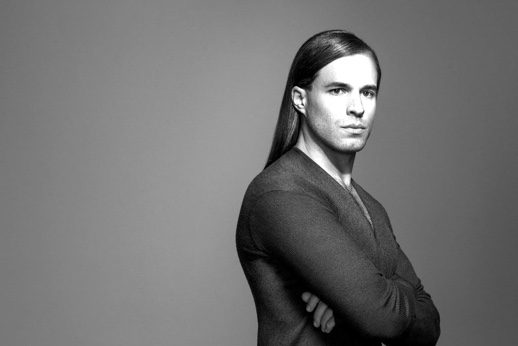

There was no obvious performance space to locate, no point upon which to force one’s gaze. We were a muddled collection of people sitting, facing all different directions, and looking at different things.
After a bit of uncomfortable fidgeting, where most of the audience passed the time checking their phone (myself included), the room sank into semi-darkness. We put our phones away and became quiet. The performance began. On the wall there was a projection of a cityscape—tall buildings, a blank sky interrupted every so often by the slight movement of a passing plane.
The violinist, Johnny Gandelsman, began to play the monotonous opening passages. After a long series of arpeggios, the singers, from Choral Chameleon, began to phonate. There was a moment of disorientation—they were seated among the audience, dressed in street clothes, silently with us the entire time—that is until they made themselves known. A young woman was singing directly in front of me; we were facing each other.
Madrigal Opera (1980) is not really an opera. As National Sawdust’s program for the evening describes, it’s an “an artful paradox: a music theater work with no specific theatrical content.” The piece refuses the pre-determination of narrative, relying instead on the sensibilities of whichever director chooses to stage the work.
Therefore, if a narrative is to be imposed on the opera, it’s up to the director to determine that narrative, to make it clear, and to use the music written by Glass to illuminate it.
I find the enterprise deeply frustrating: withholding in the worst possible sense. But still, Glass’ music manages, despite its limitations, to be beautiful and strangely productive. His work is so clearly idiomatic that it’s impossible to mistake his composition for someone else’s.
It’s both easy and difficult at the same time: unrelentingly clear in repetition and progress, but also tautologically cruel in length. For example: Madrigal Opera is only seventy minutes long; it felt endless.
Four parts structure the piece, written for violin, viola (an endlessly energetic William Frampton), and six voices. One hears all the expected hallmarks of a Philip Glass composition. There is repetition, voices chanting meaningless text—long stretches of meditation and recursive hypnotism. And there are also swaths of silence as well, moments that recall the experiments of John Cage.
Regarding the “theatrical content”—which was imported by NS Artist in Residence R.B. Schlather—I felt ambivalent. As the performance began, a sense of dread washed over me, as if I had been placed in time-out, forced into silent reflection until the end. My initial, physical reaction was to get up and leave.
But the formal constraints of etiquette prevented me. I had to relax into my seat and let the experience wash over me. Schlather’s conceit is forced meditation, and the director’s main intervention is to compel his audience to stare at one another while we listen to Glass’ music.
As much as I might roll my eyes at such a gimmick, the results were extraordinary. During the performance I found myself with nothing to do but listen to the music and study the face of a girl sitting diagonally from me. She had pale skin and curly brown hair. She looked bored—perhaps confused.
Who was this young woman, and where had she come from? What did she think of the piece? She leaned in her chair, closed her eyes, and at one point she began to sway with the music.
And then across the way a young man—twenty-two or twenty-three?—with an innocent looking face, large sensitive eyes. He began to openly weep, tears streaming down his cheeks.
There was an older man too, wearing a hat and leaning forward with an expression of anticipation. He looked like Steve Reich. Maybe it was Steve Reich? Did it matter? He listened attentively. He fell asleep. He woke up. He bowed his head to listen again, with even greater concern.
Meanwhile, on the wall, the projection of the cityscape began to dim. Night was approaching. It was only then that I realized that the projection was a video feed from outside, perhaps stationed on the roof. This imagery recalled the minimalist exercises of Andy Warhol in such films as Empire and Sleep, works of art that take our attention to the extreme.
If there was a narrative for this Madrigal Opera, it was the narrative of time passing—the inevitable slipping away of the present. “Look!” the piece seemed to exhort. “Pay attention!”
The music played on and on. Time passed, and we stared into the faces of the people sitting in front of us. We were forced to hold that moment together, to engage in time as a community, silently acknowledging one another without the succor of distraction, without the release of some other surface—iPhone, computer, TV, newspaper—whatever tool one uses to avoid the chaotic world, to avoid the dread of another person’s face.
It was a timeout—but maybe it was a timeout we deserved. Schlather’s direction made space for reflection, a bittersweet reckoning. He forced us to be quiet, to listen to Glass’ repetitive soundscape—continuous pulsations, unrelenting like a breathing body, like heartbeats.
Meanwhile, the singers continued on with their senseless words, sometimes using the language of solfeggio. A singer near me: “Si, mi, Si, Mi, La, Do, La, Do, Si, Mi, Si, Mi, Si, Mi, Si, Mi…” What I began to hear was: “Si, Mi, Si, me, See, Me, See, Me, See me, See me, See me, See me…”
She was practically begging me to look at her. And so I did my best. I tried to look at her. I tried to see her.

























Comments